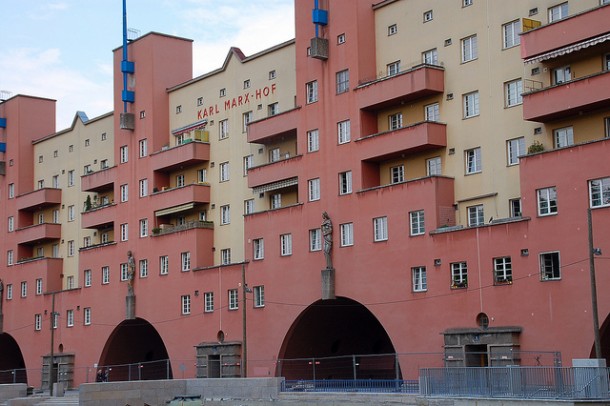Austromarxism is a phenomenon of Austria’s history in the beginning of the 20th century. It was then when the social welfare state was build up and people profiting from social reforms and support by the government in the area of education, employment and housing. For now, however, there’s no such thing left. Focus of the current reigning social-democratic party (SPÖ) now is on avoiding the right-wing populist party FPÖ, whilst their own party program is pushed back at the same time.
The Austrian president is the highest position to be held in the Republic of Austria, however it’s the Federal Chancellor who has the say. Austrian society today is politically split up as can be seen by recent presidential elections held in May. 49,65% have voted for Norbert Hofer, candidate of the right-wing populist party (FPÖ) and 50,35% routed for Alexander van der Bellen, being a left-winged (originally: Green party) candidate. This result clearly shows the gap of the society, both sides routing for the very opposite political attitude than the other side. Election slogans that the FPÖ uses are “the occident in the hand of christians”, “our women are too beautiful for a burka” or “homeland love instead of Morrocan thieves”. It should be stated that the mentioned election has to be redone in October, as minor mistakes have occurred when counting the votes. Still, only little changes in the result are to be expected and a clear representation of the society’s current attitude still is represented.
Tracing back, this situation is nothing new to the small country. After WWI and the fall of the Habsburg monarchy, Austria had to rebuild the country and introduced a social welfare state. Introducing new taxes to finance social progress, reforms such as maternity support, education reform, hygiene increase in hospital to tame e.g. infant death and starting sports & leisure time clubs were introduced. Even more important, women were given the right to vote and to attend university. Another reform was on housing policies, and affordable housing facilities were introduced. The introduction of unemployment insurance even orginiates from that time. This is how the idea of the Austrian Marxism, where here being interpreted as socialism, has been spread and eventually fulfilled. However, with the mid 1930s approaching, many people were unhappy of the government spending so much money on the poor and the society was on the rise of splitting up. This eventually resulted in first the Austrian civil war in 1934 and then in the National-Socialist takeover.

Karl Marx building in Vienna | Photo by Keith Ewing on Flickr
After WWII, Austromarxism was quasi non-existent until former chancellor Bruno Kreisky, SPÖ, ruled the country in the 1970s. He reintroduced social reforms, such as gender equality, break up of social classes and support especially for the working class again, just like the government did in the 1920s. He even reached full majority, which is nothing that can be seen for any political party today.
What is left of Austromarxism is the reforms of previous governments but only a minority of politicians actively promoting socialist values and aiming to literally fulfill reforms. For now, the right-wing populist party FPÖ attracts lots of working-class people, which once used to be the target group of the social-democrats. While promising to end current “plight”, the FPÖ also promotes national pride and the focus on Austrian nationals. In the meanwhile, it seems like the SPÖ has given up on its own target group and have slightly become the party of the intellectuals, mainly focusing on how to avoid the FPÖ of being in power. In the meanwhile, there’s no effort in becoming a modern socialist power once again.
Current problems again are housing, employment and migration. These circumstances clearly remind of the 1930s, where the country was split just the way it is today. The former chancellor Werner Faymann (SPÖ) resigned in April, as his support decreased drastically. With the new chancellor, Christian Kern, also SPÖ, however many people see change and social progress possible. Here, coming back to the austromarxist concept might be a possible key.


